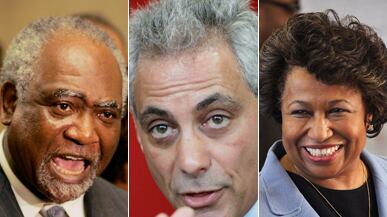To those who see a new era of post-racial politics, Chicagoans might ask: What are they smoking?
People in this hardball town scarcely blinked at the bald racial calculations behind the recent “unity” summit (convened by the Rev. Jesse L. Jackson) to produce a single major black candidate for mayor, a process that ultimately rallied behind former Senator Carol Moseley Braun.

A black candidate who stepped aside last Friday, Congressman Danny K. Davis, made no secret that he and other African-American leaders feared a split in the black vote would hand a victory to the white candidate, Rahm Emanuel, or to the leading Latino contender, Gery Chico.
“In unity,” Davis proclaimed, standing near a beaming Braun, “there is strength.”
Davis said it was “just kind of natural” for people to rally behind a candidate of their own color or ethnicity. He drew an example from his boyhood on a farm in Arkansas. “When I went into the barnyard,” he explained later during an interview, “I never saw a chicken leading a group of turkeys.”
While the winnowing of the pool of black candidates was held with great fanfare and publicity, Davis said he found it “interesting” that only one white (non-Hispanic) candidate remains in the race.
“The white community just did not go through a big pubic process,” he said. He noted that Sheriff Tom Dart, who is white, would have been a formidable candidate. “But that would have meant a significant split in the vote between Dart and Rahm Emanuel.”
“When I went into the barnyard,” he explained later during an interview, “I never saw a chicken leading a group of turkeys.”
While there had initially been talk of a dozen or more candidates running to succeed Richard M. Daley, who is retiring after 21 years in office, some shrewd political prognosticators had predicted the contest would boil down to three people: a white guy, a black guy (or woman), and a Hispanic.
For now, two Hispanic candidates remain in the contest: Chico, the former schools chief, and Miguel del Valle, the city clerk.
The first round of the election will be held in February. If no candidate wins 50 percent of the vote, a second round will be held in April between the top two vote-getters.
Some analysts, such as Monroe Anderson, say the strategy to settle on a single black candidate could backfire. Another former candidate, the Rev. James Meeks, who is black, dropped out days before the exit by Davis.
“I don’t see this as a good sign” for black electoral hopes, said Anderson, a former press secretary for the late Mayor Eugene Sawyer. “The fewer candidates you have, the greater likelihood that Rahm will make the 50-plus-one and win this thing in the first round.”
Anderson said he believed the contest would probably go to two rounds, but he said he wouldn’t bet the farm that Braun makes it to the finals.
He noted that Braun could not expect monolithic support among black voters. “Some black people just don’t like Carol,” he said. “She blew the Senate thing so badly she embarrassed them.”
Braun, whose election in 1991 as the first black woman in the U.S. Senate, had been joyously heralded in Chicago. But she made a series of questionable judgment calls as a senator. She was the subject of a 1993 Federal Elections Commission investigation of $249,000 in campaign money that had gone unaccounted for. The agency ultimately found some minor violations, but took no action against her.
She was accused by staff members of ignoring complaints of sexual harassment against her campaign manager and one-time fiance, Kgosie Matthews.
She was widely criticized for traveling several times to Nigeria to meet with the nation's dictator, Gen. Sani Abacha, despite U.S. sanctions against the regime for human-rights violations.
Braun has defended herself by saying that, despite intense scrutiny, she was never convicted of any wrongdoing. More than once, she has suggested that racism has been behind criticism of her actions.
As she demonstrated in the Senate, Braun can be eloquent, and she can turn on an appealing charm. But she also has a reputation for being brusque and dismissive.
Earlier in the campaign, she said she would not be disclosing her tax returns. Asked why not, she responded curtly: “Because I don’t want to.” This week, she reversed her position and said she would disclose the returns.
Braun, a former ambassador to New Zealand who now owns a food business, has acknowledged financial struggles that caused her to delay paying her property taxes.
In the mayoral race, she has the financial backing of John W. Rogers, who owns a Chicago investment firm, Ariel Capital, and was a key fundraiser for Obama in 2008.
Emanuel is believed to have a bulging war chest. Chico’s law firm, meanwhile, has netted millions.
To win black support, Emanuel is expected to run television ads featuring him with his old boss, Barack Obama. The president remains overwhelmingly popular among people of all colors in his hometown.
While Obama has praised Emanuel and said he would make “a great mayor,” he is not expected to make a formal endorsement in the contest. It could be sticky business for Obama, especially if the race takes a turn for the brutal.
When Davis left the mayoral contest, Emanuel issued a statement from Thailand, where he was vacationing, praising the congressman and noting, "His views will be needed in the dialogue about the city's future."
People in this city who are old enough to remember the election of Chicago’s first black mayor, Harold Washington, in 1983, shudder at the prospect of a brawling contest tinged with racial bitterness.
The vicious racial politics of the 1980s in Chicago gave the city an ugly reputation. As a candidate, Washington was hooted down the steps of a Roman Catholic church. During the general-election contest with a little-known Republican, Bernard Epton, some white Chicagoans wore all-white campaign buttons that said nothing, but got the message across.
But times change, even in Chicago politics. Obama in 2008 won some white ethnic wards in the Bungalow Belt that had been overtly hostile to Washington.
Mayor Daley, who won his first election in 1989 with a mere 6 percent of the black vote, would ultimately make enormous electoral gains among African-American voters. By the end of his tenure, he has become accustomed to carrying the black vote by wide margins, even when he has run against black opponents.
Dirk Johnson is former Chicago bureau chief for Newsweek and The New York Times.





